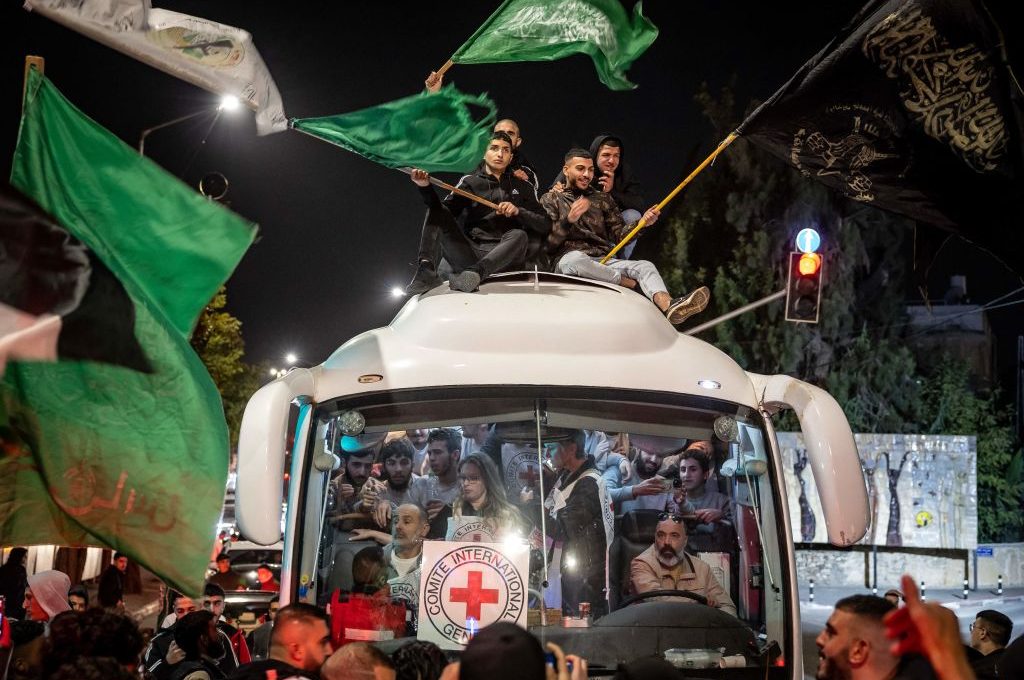Hamas’s most valuable assets are the American hostages it holds. That simple fact means the terrorist organization will demand the highest value in return.
What can America give Hamas in exchange?
Not prisoners, since the US doesn’t hold any Hamas fighters. That means the US cannot follow the Israeli pattern of giving Hamas three Palestinian prisoners in exchange for every one held by Hamas.
Nor can America provide boatloads of cash, as the Biden administration has for Iran. Biden could continuing giving Iran money, but that is much harder in the midst of war. And it is untenable politically to pay Hamas directly while the fighting continues. The Biden team might promise to help rebuild Gaza later, but that’s not valuable to Hamas right now, as it fights for its life. Congress would likely reject it, in any case.
That leaves only one thing the US can really do to help Hamas in exchange for the hostages. It can put as intense pressure on Israel to pause the fighting and delay its resumption.
That is exactly what the Biden administration has done. Indeed, it played a major role in securing the current pause and hostage exchange, which has been extended for another two days as the initial, four-day pause entered its final day.
Washington was not alone in seeking the return of its citizens. Bangkok was also involved, since some Thai citizens were also seized. That part of the deal was brokered by Iran. About half the two dozen Thai hostages were released, with reports that the remainder will be released soon. What we don’t know yet is what Iran got in return. The mullahs in Tehran surely demanded something more than a smile and a handshake.
The deal for Israeli and American hostages was brokered by Qatar, a close ally of Iran and a longtime financial supporter of Hamas. The deal involved about one-quarter of the hostages Hamas holds and entailed a four-day pause in the fighting.
The US was less successful in its second “ask,” getting Israel to stop moving Palestinians out of northern Gaza, where the fighting is most intense, and allowing those who had moved south to return. David Satterfield, special US envoy to the Middle East for humanitarian issues, emphasized that Palestinians civilians, forced to move to south, must be allowed to return. Senior Israeli sources said, anonymously, that Prime Minister Benjamin Netanyahu had rejected a clause in the proposed hostage treaty that would have allowed that. “The IDF,” the official said, “still plans to continue operating after the several days’ pause in hostilities expires.” It is hard to understand why the US thinks it is a humanitarian gesture to return Palestinians to an active war zone.
In any event, the key American goal was to pause the fighting in hopes of getting back the American hostages. The aspiration is understandable. Voters expect their presidents to get hostages back (ask Jimmy Carter) and consider it a mark of weakness or incompetence if they fail. Getting the IDF to pause the fighting was Washington’s best bargaining chip in dealing with Hamas for the American hostages. Indeed, it may have been the only bargaining chip.
It is not surprising, then, that foreign policy officials in Washington and their envoys to the region pushed hard for the current pause. Hamas, which was suffering huge losses every day, wanted the deal and bargained for as much as it could get in return. It wants as much time as possible to regroup and to move its top commanders out of harm’s way. It wants as much time as possible for international pressure to build on Israel to stop the war altogether.
Israel’s interests are exactly the opposite. It doesn’t want to give Hamas time to regroup. It doesn’t want international pressure to build. And it doesn’t want to freeze the IDF in place, losing its momentum in the fighting.
Understandable as the American strategy is, it is undermined by a fundamental flaw. Hamas has every incentive to hang onto its American hostages as long as it can. It may give one or two back during the current deal, but it won’t go much further. Why should it? It will demand another pause before returning more, and yet another pause after that.
The logic for Hamas is straightforward. As soon as they return all the American hostages, they lessen the incentives for Washington to apply intensive pressure on Jerusalem to pause the fighting or stop the war. Hamas knows that and knows it benefits from a longer pause. The conclusion is obvious: Hamas will delay returning the American hostages so Washington will keep pushing Netanyahu to extend the pause. Since Hamas benefits from the delay, it will try to stretch out that process for as long as possible.
Israel is bound to resist that pressure. Much as Netanyahu and his cabinet want to avoid a clash with the US over this issue, they cannot allow a short pause to become a long ceasefire. To do that would prevent Israel from achieving its main goals in the war. Those goals are to destroy as much Hamas leadership and infrastructure as possible, end their governance of Gaza, and deter the resumption of terrorist attacks on Israel.
Resisting that pressure won’t be easy for the Netanyahu war cabinet. As long as the hostages are held, the government will face internal pressure from their families and external pressure from Washington. The longer the pressure from Washington continues, the more damage it does to the bilateral relationship, the only one that really matters to Israel. That’s good news for Iran, Hamas and Hezbollah, and bad news for Israel’s relations with other Arab states. But, in the end, no Israeli government could let its relationship with Washington override its central objectives in a war Hamas started: dealing a harsh blow to that terror organization and limiting the lethal threat it poses to all Israelis.


























Leave a Reply